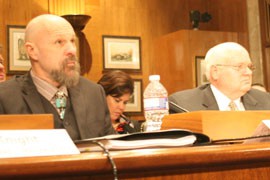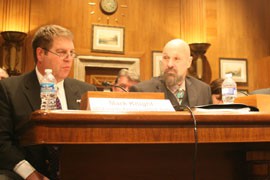Cronkite News has moved to a new home at cronkitenews.azpbs.org. Use this site to search archives from 2011 to May 2015. You can search the new site for current stories.
Mohave County official urges Congress to lift Grand Canyon mining ban
WASHINGTON – The chairman of the Mohave County Board of Supervisors called on the federal government Tuesday to revoke a recently imposed 20–year ban on uranium mining near the Grand Canyon.
Buster Johnson, testifying at a congressional Western Caucus hearing on private–property rights, said the ban on new mining claims on 1 million acres in Mohave and Coconino counties is hurting an already struggling local economy.
“Every new job created in our sparse part of the country is worth 10 times to us what one job created in a big city is worth,” said Johnson, citing job losses in the region’s mining and timber industries since the mid–1990s.
“There are many personal stories I could relate to you, but I will sum it up with the fact that Kane County (Utah) suicide rate is now four times the national average,” Johnson said. “These numbers are indicative of the death of our area with the removal of employment opportunities.”
Johnson, who is co–chairman of the Arizona/Utah Local Economic Coalition, cited a 2009 study that said the mining could bring Mohave and Coconino counties 1,078 new jobs, $20.4 billion in output and $2 billion in federal and state corporate income taxes over the next 40 years.
But environmentalists scoffed at claims from opponents of the ban. While there could be short–term job growth from mining, they said, little of the income would stay in the area and the jobs would not last.
“Most of the jobs that continued from the last uranium boom are in the clean–up industry,” said Roger Clark, Grand Canyon program director with the Grand Canyon Trust.
He called mining in the area an “inappropriate industrialization” of the land that could harm Native residents, as well as the area’s diverse plants and animals.
Interior Secretary Ken Salazar imposed the new mining ban in January, citing the protection of the Grand Canyon. The decision followed two years of efforts by environmentalists to limit mining in the region.
But Johnson said Tuesday that the environmental footprint of uranium mining is minimal and mines would be miles away from Grand Canyon buffer zones.
“It perpetuates a fraud on the people by saying that the Grand Canyon is going to be harmed,” he said.
He challenged the administration’s claim that uranium mining in the region would damage tourism, noting that mining was going on from 1981 to 1990 when traffic to the Grand Canyon jumped from 2 million to 4 million visitors.
Claims that mining “will harm the Grand Canyon ecosystem thereby ruining the region’s tourism–based economy is pure fear mongering and totally ignores uranium mining’s track record in the area,” Johnson said.
He said local governments in Arizona and Utah plan legal action in coming weeks to challenge the ban, and said later that they hope to get the state of Arizona to file suit.
Rep. Paul Gosar, R–Flagstaff, called Johnson’s testimony “exactly right” and said the red tape of federal agencies was blocking economic productivity.
“The environmentally responsible development of vast energy and mineral resources in the Arizona Strip would expand our domestic energy supply, create new, high–paying jobs and lessen our dependence on foreign energy and minerals and generate revenue for federal and state treasuries,” Gosar said at the hearing.
But Clark argued that environmental documents supporting uranium mining in the region 20 and 30 years ago are “extraordinarily outdated” and are contradicted by newer information.
He said roads and power lines that come with new mines would “fragment wildlife in an otherwise open landscape.” Groundwater could become tainted with uranium and contaminate springs in the Grand Canyon in an arid area where such water sources are especially important to wildlife.
“The ban and the legal challenges to it are critically important as we look forward,” Clark said.
The hearing came the day after mining and nuclear–power associations filed suit in Phoenix to overturn the ban.








